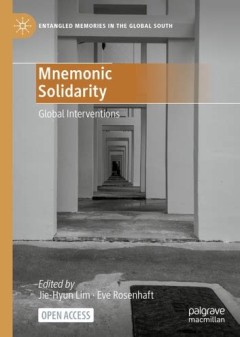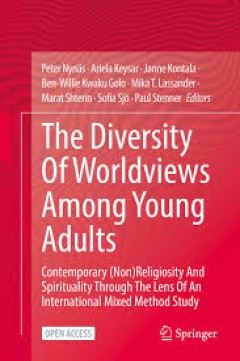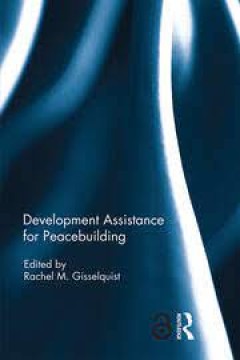Filter by

A Short History of Christianity beyond the West: Asia, Africa, and Latin Amer…
Today, the majority of the world's Christian population lives in the Global South. Knowledge of their history is therefore indispensable. This textbook offers a compact and vivid overview of the history of Christianity in Asia, Africa and Latin America since 1450, focussing on diversity and interdependence, local actors and global effects. Maps, illustrations and numerous photos as well as cont…
- Edition
- Volume: 31
- ISBN/ISSN
- 9789004699830
- Collation
- -
- Series Title
- -
- Call Number
- -

Mnemonic Solidarity : Global Interventions
This open access book provides a concise introduction to a critical development in memory studies. A global memory formation has emerged since the 1990s, in which memories of traumatic histories in different parts of the world, often articulated in the terms established by Holocaust memory, have become entangled, reconciled, contested, conflicted and negotiated across borders. As historical act…
- Edition
- 1
- ISBN/ISSN
- 9783030576691
- Collation
- XI, 135 hlm; ill., lamp.,
- Series Title
- -
- Call Number
- -

Modern Japan’s Place in World History
This Open Access book includes chapters on the key turning points in modern Japanese history from the Meiji Restoration to Japan-China diplomatic normalization in the 1970s and beyond. The topics covered include the First Sino-Japanese War, the Russo-Japanese War, the First and Second World Wars, the Manchurian Crisis, the US Occupation, postwar Japan-China relations, and postwar decolonization…
- Edition
- 1
- ISBN/ISSN
- 978-981-19-9592-7
- Collation
- XVIII, 211
- Series Title
- -
- Call Number
- -

The Diversity Of Worldviews Among Young Adults
How can we comprehend contemporary forms of religion? What is an adequate methodological approach? Religion as an object of study has become increasingly evasive and there is an urgent need to address the limitations emerging from previous conceptual bias and limited empirical perspectives. This chapter presents the international research project Young Adults and Religion in a Global …
- Edition
- -
- ISBN/ISSN
- 9783030946913
- Collation
- XXV, 381
- Series Title
- -
- Call Number
- -

Logischer Empirismus, Lebensreform und die deutsche Jugendbewegung: Logical E…
This open-access book is the first to investigate the roots of Logical Empiricism in the context of the Life Reform and the German Youth Movements. Rudolf Carnap and Hans Reichenbach are the key protagonists; they both belonged to the German Youth Movement and developed their early philosophical views in this setting. By combining scholarly essays with unpublished and hard to access manuscripts…
- Edition
- -
- ISBN/ISSN
- 978-3-030-84887-3
- Collation
- X, 356
- Series Title
- -
- Call Number
- -

E-Cigarettes and the Comparative Politics of Harm Reduction
This open access book offers the first in-depth study of the history and current debates surrounding electronic cigarettes comparing the UK, US and Australia. Since their introduction, e-cigarettes have been the subject of much public, media and regulatory attention, with discussion centring on whether these devices encourage or discourage smoking. This study delves into the history of policyma…
- Edition
- 1
- ISBN/ISSN
- 978-3-031-23658-7
- Collation
- XIV, 144
- Series Title
- -
- Call Number
- -

Early Public Libraries and Colonial Citizenship in the British Southern Hemis…
This open access Pivot book is a comparative study of six early colonial public libraries in nineteenth-century Australia, South Africa, and Southeast Asia. Drawing on networked conceptualisations of empire, transnational frameworks, and ‘new imperial history’ paradigms that privilege imbricated colonial and metropolitan ‘intercultures’, it looks at the neglected role of public librarie…
- Edition
- 1
- ISBN/ISSN
- 978-3-030-20426-6
- Collation
- -
- Series Title
- New Directions in Book History
- Call Number
- XVII, 159

Remembering African Labor Migration to the Second World
This open access book is about Mozambicans and Angolans who migrated in state-sponsored schemes to East Germany in the late 1970s and throughout the 1980s. They went to work and to be trained as a vanguard labor force for the intended African industrial revolutions. While they were there, they contributed their labor power to the East German economy.
- Edition
- 1
- ISBN/ISSN
- 978-3-031-06776-1
- Collation
- -
- Series Title
- Palgrave Macmillan Transnational History Series
- Call Number
- XXVII, 377

Cyborgs in Latin America
A PDF version of this book is available for free in open access via the OAPEN Library platform, www.oapen.org . Cyborgs in Latin America explores the ways cultural expression in Latin America has grappled with the changing relationships between technology and human identity.
- Edition
- 1
- ISBN/ISSN
- 978-0-230-10977-3
- Collation
- -
- Series Title
- -
- Call Number
- XI, 212

Development Assistance for Peacebuilding
Development assistance to fragile states and conflict-affected areas can be a core component of peacebuilding, providing support for the restoration of government functions, delivery of basic services, the rule of law, and economic revitalization. What has worked, why it has worked, and what is scalable and transferable are key questions for both development practice and research into how peace…
- Edition
- -
- ISBN/ISSN
- 9781138080461
- Collation
- -
- Series Title
- -
- Call Number
- -
 Computer Science, Information & General Works
Computer Science, Information & General Works  Philosophy & Psychology
Philosophy & Psychology  Religion
Religion  Social Sciences
Social Sciences  Language
Language  Pure Science
Pure Science  Applied Sciences
Applied Sciences  Art & Recreation
Art & Recreation  Literature
Literature  History & Geography
History & Geography